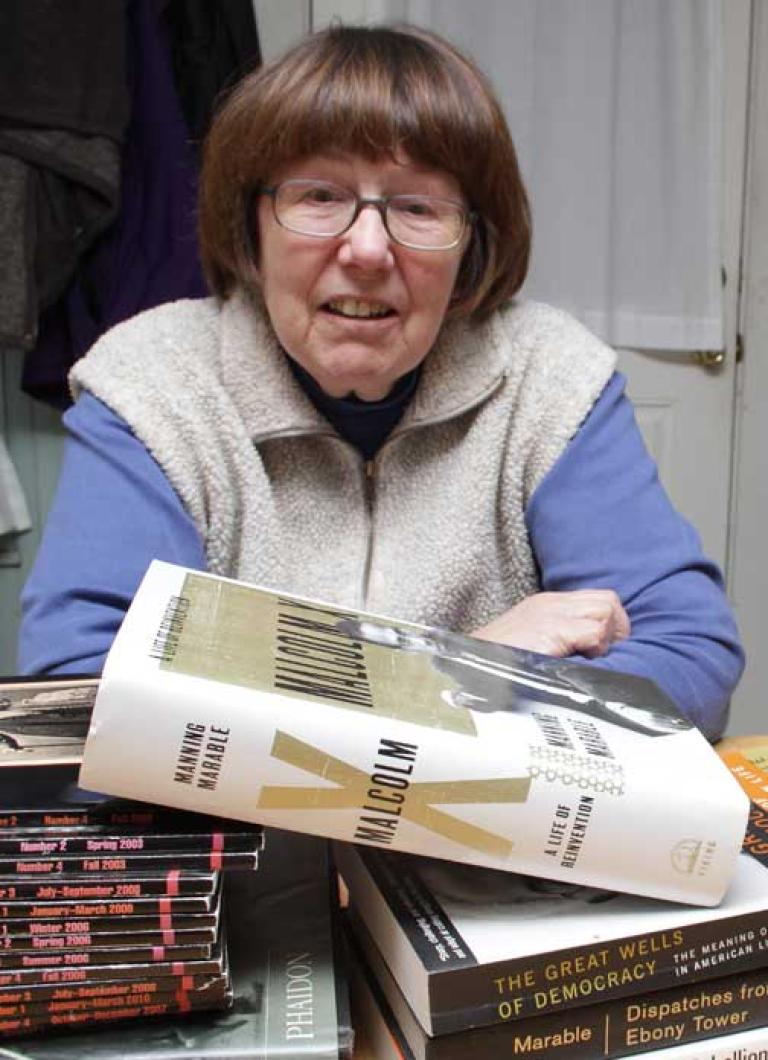Twelve years ago, as transcriptionist Sara Crafts remembers it, a “nice couple” walked into her home office in Oak Bluffs and asked if she could type up a series of extended photo captions for a forthcoming book. She took the job, not knowing it would lead to a life-changing collaboration.
“A lot of people walked in then,” she said during an interview at her Oak Bluffs home. “I didn’t pay particular notice.”
The captions were for Freedom: A Photographic History of the African American Struggle, written by Columbia University professor Manning Marable, a former Vineyard summer resident, and his wife, Leith Mullings. The project led Ms. Crafts to regular transcription work for Mr. Marable.
The Marable-Crafts collaboration culminated in his seminal work, a 604-page biography of Malcolm X, eight years in the writing.
Mr. Marable passed away at age 60 in April 2011 due to complications from pneumonia, just three days before the publication of Malcolm X. The book was listed as one of the New York Times’ Top 10 Books of the Year and was nominated for the National Book Award.
And last weekend, Malcolm X won the Pulitzer Prize for History.
Ms. Crafts is no stranger to award-winning work—she typed up an early draft of Sophie’s Choice for William Styron—but working with Mr. Marable on the biography was different. “I used to tell him he should not be paying me, I should be paying him,” Ms. Crafts said. “It was the best job I ever had. He taught me something every time he called me on the phone.
“What I knew about Malcolm X you could have put in a thimble and stirred before starting this project.”
The transcription process was straightforward, a blend of early-twentieth-century quaintness and late-century technological prowess. Mr. Marable handwrote the entire book, faxing each page to Ms. Crafts. If he happened to be at his summer home in Oak Bluffs, she would go pick up pages at his house, after which she would convert his careful print—always pen, never pencil—into exacting type on her desktop computer.
“A good deal of [Malcolm X] was written on the back porch of his home here,” said Ms. Crafts. “All of it was transcribed here.”
Work on the project began in 2002, but Mr. Marable was not one to simply focus his energies on a single tome. Between 2002 and the publication of Malcolm X in 2011, Ms. Crafts transcribed seven of his other books, including The Autobiography of Medgar Evers (written in collaboration with Evers’ widow, Myrlie Evers-Williams), countless speeches, a regular column (“Along the Color Lines”), and submissions to “Souls,” a Columbia journal of African-American studies Mr. Marable founded in 1999.
“He never wasn’t writing,” Ms. Crafts said.
Still, she said, “Manning always had time for everybody and everything...he was remarkably generous with his time, even when he was ill.”
Ms. Crafts owns two copies of Malcolm X, one with a signed bookplate Mr. Marable inscribed before he died. Both copies—indeed, all copies—of the book contain two lines, tucked into the Acknowledgements section, that speak to the importance of the longstanding author-transcriptionist relationship: “Sara Crafts has been my primary manuscript typist for many previous book projects, and she has done a superb job of processing the many different versions of each chapter and keeping the corrected manuscripts on track. I have always valued her friendship and advice.”
“Manning gave me credit, which I appreciate” she said, flipping through the pages. “Oddly enough, not everybody does that [for transcriptionists].”
“I thought, I guess, that he would never die,” Ms. Crafts continued. “If he could survive a double lung transplant [in July of 2010], he could survive anything.”
But Mr. Marable’s voice lives in each of his works. And with the Pulitzer comes a near-certainty of his legacy as both a scholar and author.
“To have this honor is great,” Ms. Crafts said, “because now [the book] will go on.”





Comments (3)
Comments
Comment policy »